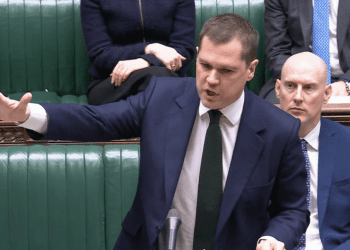After the capitulation come the recriminations. A beleaguered Keir Starmer appeared for PMQs in the commons this afternoon for the first time in three weeks — with Angela Rayner having subbed in for the prime minister across recent sessions.
He did so against an immediate backdrop of political chaos.
It took just days for the government’s bullishness on its flagship welfare bill to reimagine itself as meek acquiescence. Facing possible defeat in the commons, Starmer approved one final, eleventh-hour concession on his government’s welfare proposals. The result is a gutted bill: legislation straddling the liminal plane between existence and expiration.
It was left to Sir Stephen Timms, the disabilities minister, to banish the bill into political purgatory at around 5.26 pm yesterday. After crunch talks between Downing Street and Labour’s rebel representatives, Timms told the commons that changes to restrict eligibility for the Personal Independence Payment (Pip) will be delayed until after a review of the disability benefit, instead of coming into force in November 2026 as set out in the bill.
The government’s original welfare reforms were designed to save approximately £5 billion by 2030. The Institute for Fiscal Studies (IFS) has decreed that, as a result of Starmer’s concessions, the government savings amount to zero, nothing.
***Politics.co.uk is the UK’s leading digital-only political website. Subscribe to our daily newsletter for all the latest news and analysis.***
Rachel Reeves has been forced back to the drawing board by Labour MPs. The PM can no longer rely on his massive working majority, of no less than 165 MPs, to rubber-stamp his difficult decisions.
In the end, the zombie welfare bill staggered over its first commons hurdle with 335 votes in favour versus 260 against. Despite Starmer’s successive U-turns, 49 MPs still voted against his reforms. And so the prime minister’s majority was sliced by over half (to 75).
Starmer vowed to end the chaos — the steady churn of psychodrama that sickened the nation of Conservative rule. That was the central promise of Starmerism. But the scenes in the commons yesterday were eerily reminiscent of the decadence of late Conservatism. Not since an October 2022 opposition day vote on fracking, which preceded Liz Truss’ downfall as PM, has the chamber been such a pit of political acrimony.
Starmer’s task now is to show yesterday’s drama was a blip — and not the latest lamentable loop on the doom spiral of decay.
It’s a cruel reality for any prime minister — especially one whose premiership is, in simple temporal terms at least, relatively fresh. But it is sweet succour for a leader of the opposition. Starmer seized on prime ministerial implosions as LOTO. With the PM exposed, how did Kemi Badenoch fare today?
The Tory leader has been getting her practice in as a commons performer. Chris Philp, the shadow home secretary, and Mel Stride, the shadow chancellor, stepped in to helm recent sessions of PMQs — but Badenoch has returned the favour by subbing herself in for shadow ministers. She responded (in Philp’s stead) to the home secretary’s statement last month on the Casey report. And she took on work and pensions secretary Liz Kendall in the commons yesterday, delivering a typically combative response in the welfare bill debate.
She continued in this vein this afternoon. Rising to the opposition despatch box, the Conservative leader first sought an admission that the welfare bill will amount to zero “savings” after the government’s U-turns.
The prime minister defended his watered-down bill, saying it would “rebalance Universal Credit” and that it was “consistent” with the principles he had spoken to “throughout”. The evasion prompted Badenoch to answer her own question. The welfare bill had been “completely gutted”, she said, and it “doesn’t save any money — it is going to cost billions”.
The Tory leader added: “This is the first prime minister in history to propose a bill to save money who ended up with a bill that costs money.”
It did not take long for Badenoch to direct her fire at Rachel Reeves, the embattled chancellor. Gesturing to the government frontbench, she said Reeves looked “absolutely miserable”.
“Labour MPs are going on the record saying that the chancellor is toast and the reality is that she is a human shield for his incompetence.
Badenoch asked: “In January, he said that she would be in post until the next election. Will she really?”
Starmer refused to back his chancellor in so many words. Rather, he used the opportunity to mock the Conservative leader’s PMQs performances, which he maintained “always” cheer him up. “[Badenoch] makes a complete mess of it and shows just how unserious and irrelevant they are”, Starmer added.
At cabinet yesterday, Starmer leapt to the defence of his chief of staff, Morgan McSweeney, who has faced a similarly unrelenting torrent of hostile briefings in recent days. The PM declared he “will not countenance” criticism of McSweeney, crediting him with Labour’s general election victory in 2024.
Today, albeit in a public setting, the PM refused to do the same for his chancellor. It’s an inconsistency Starmer should avoid any suggestion of — lest excitable commentators begin to over-interpret his intentions.
Indeed, at that moment — whatever No 10 went on to clarify later — Badenoch’s question demanded an answer. The risk was obvious: the PM’s decision not to explicitly guarantee Reeves’ position would contribute to the sense of instability and drama.
As the prime minister equivocated, a lone tear rolled down Reeves’ face. The scene was quickly clipped up for social media, sending Westminster into a frenzy of speculation.
A spokesperson later confirmed that Reeves was reacting to a “personal matter, which — as you would expect — we are not going to get into”. They added: “The chancellor will be working out of Downing Street this afternoon.”
Reeves is reported to have had an “altercation” with commons speaker Lindsay Hoyle prior to PMQs.
With the chancellor visibly upset, Badenoch’s response bordered on being overly personal. She remarked: “How awful for the chancellor that he couldn’t confirm that she will stay in place.”
***Politics.co.uk is the UK’s leading digital-only political website. Subscribe to our daily newsletter for all the latest news and analysis.***
Starmer, for his final contribution, issued what in other circumstances could be read as a fulsome statement of support. He listed a series of purported Labour achievements, celebrating each as a “promise made [and] delivered”. He closed: “We’re only getting started. The chancellor has led on all these issues, and we’re grateful to her for it.”
But having refused to guarantee Reeves’ position, this remark could just as easily be interpreted as a statement of thanks before a summary sacking.
As PMQs concluded, Reeves was met and comforted by her sister Ellie, who serves as Labour chair. They left the chamber together.
No 10 went on to insist that the chancellor is “going nowhere” and that she has the prime minister’s “full backing”. As for why Starmer did not express his support for Reeves at the despatch box, the spokesperson responded: “He has [backed Reeves] plenty of times, he doesn’t need to repeat it every time the leader of the opposition speculates about Labour politicians.”
But the brutal reality of politics is that Reeves’ standing has been vastly diminished as a result of the welfare climbdown yesterday. Her reputation as an “iron chancellor” — of certain resolve and unyielding will to sell tough decisions to a squeamish party — has been undermined by the evidence of Labour’s welfare fiasco.
This reputation, forged over years in opposition, was the source of her political authority. It is unsurprising then, that speculation as to her future has refused to abate.
Briefings against Reeves and her policies are an increasingly recurrent feature of the political news cycle. Her policies have been rebuffed on more than one occasion by Labour MPs. Crucially, some of her colleagues have come to the conclusion that the chancellor is the common denominator underpinning their party’s travails.
Starmer will know the risks of losing a chancellor so early into his premiership, of course.
For all the speculation today and Badenoch’s targeted attacks, the government’s woes are far bigger than any one person. The welfare debacle reflected a collective failure of strategy, management and authority: a total political breakdown.
A single sacking will not repair the disorder it revealed — or the damage it wreaked.
Josh Self is editor of Politics.co.uk, follow him on Bluesky here and X here.
Politics.co.uk is the UK’s leading digital-only political website. Subscribe to our daily newsletter for all the latest news and analysis.
The post PMQs verdict: Labour’s woes are bigger than Rachel Reeves appeared first on Politics.co.uk.

































